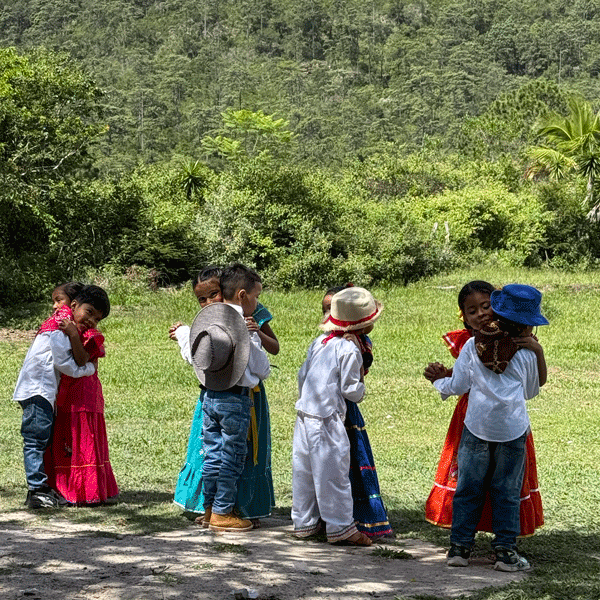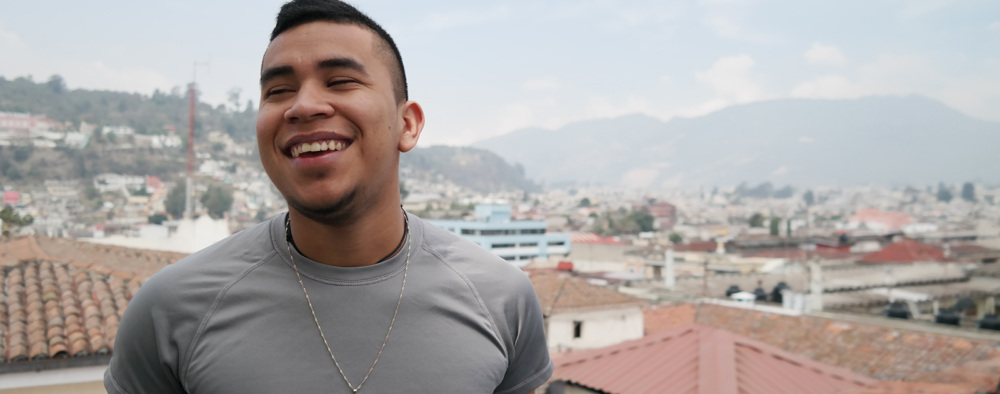
Educação
Educação, Justiça de gênero, Segurança e bem-estar, Poder da juventude
Nota do editor: esta postagem também está disponível em Espanhol.
Meu nome é Gerardo López.
Eu sou de El Salvador,
e esta é a minha história.
Quando eu tinha sete anos, minha mãe tomou a decisão mais difícil da vida dela. Ela decidiu ir para os Estados Unidos em busca de uma vida melhor para mim e minha irmã. Ela deixou minha irmã com nossa avó e eu com nossa tia e foi embora. Seis meses se passaram antes que eu tivesse notícias da minha mãe.
Quando soubemos que ela finalmente chegou a Los Angeles, tudo começou a mudar – mas não para melhor. Pensei comigo mesmo: “Agora poderei jogar como todas as outras crianças da minha idade.” Eu estava errado. Minha tia começou a me impor restrições. De repente, não me deixaram mais ir à escola e fui obrigada a trabalhar.
“Se você não trabalhar, não comerá”, dizia minha tia.
Eu tinha sete anos quando fui forçado a trabalhar como um homem adulto no campo.
Embora minha mãe enviasse dinheiro constantemente para minha tia, as restrições se tornaram cada vez mais cruéis. Refeições viraram sobras, roupas limpas e banhos viraram luxo, e meu corpo ficou marcado por hematomas e cicatrizes. Um dia, voltando de um dia de trabalho no campo, cheguei em casa e encontrei minha tia conversando com uma assistente social. Fiquei paralisado de medo e pude ver nos olhos da minha tia o que aconteceria se eu contasse o que realmente estava acontecendo naquela casa – então não disse nada.
O ambiente antes calmo e amoroso tornou-se violento e volátil. Aos nove anos, deixei a casa da minha tia para sempre. Até hoje, ainda guardo as cicatrizes dos abusos físicos e mentais dela.
Pelos próximos sete anos, vivi nas ruas de um dos países mais perigosos do mundo. Eu tinha ressentimento contra minha mãe e minha família, então cortei completamente os laços com eles. Dormia na rua, chova ou faça sol, raramente tinha comida no estômago e tentava manter a cabeça baixa e longe da violência das gangues.
Tentei frequentar salas de aula abertas, mas só consegui chegar à sétima série, porque tive que dedicar todo o meu tempo simplesmente à sobrevivência. Eu estava sem teto e sozinho. El Salvador me via como lixo, um ladrão, um criminoso – então fui tratado como um.
Só aos 16 anos é que finalmente me reconectei com a minha mãe. Pela primeira vez, verbalizei o que me tinha acontecido na casa da minha tia. Pela primeira vez, comecei a falar a minha verdade.
Finalmente consegui sentir um pouco de felicidade com o apoio da minha mãe.
Minha mãe me perguntou: “Você quer vir aqui?”
Era março de 2015 quando, sem hesitação, Decidi seguir minha mãe para os Estados Unidos.
Poucos meses antes do meu aniversário de 18 anos, deixei El Salvador. A viagem foi tranquila até chegarmos à fronteira entre a Guatemala e o México. Um mês inteiro se passou antes que pudéssemos cruzar a fronteira para o país.
Em um posto de controle de migração, a senha que nosso coiote nos deu falhou. Para continuar, tivemos que pagar mais 1.500 pesos por pessoa, ou seríamos deportados. Nenhum de nós tinha esse dinheiro. Como um grupo de dez, conseguimos juntar 1.600 pesos.
Eles nos deixaram continuar.
Em um ônibus com destino a Reynosa, no México, fomos capturados e sequestrados. Dois jovens membros do Cartel do Golfo invadiram o ônibus, cobriram nossas cabeças com sacolas e exigiram que descêssemos.
"Nada vai acontecer com vocês. Estamos aqui para resgatar as pessoas que já pagaram os agentes da imigração. Podemos fazer isso do jeito bom ou do jeito ruim, você decide."
Um por um, descemos do ônibus.
Eles nos colocaram em outro caminhão e nos levaram para um armazém abandonado. Havia provavelmente outros 75 reféns – velhos e jovens, homens e mulheres, até crianças pequenas. Para sobreviver, era preciso pagar pela liberdade ou trabalhar até ter o dinheiro que eles exigiam. Para a maioria de nós, isso era um beco sem saída ou a morte literal.
Duas semanas depois, fuzileiros navais e policiais mexicanos prenderam nossos captores. Mais uma vez, fomos colocados em um caminhão, e realmente acreditávamos que estávamos seguros. Menos de meia hora depois, entramos em um beco escuro e recluso... apenas para sermos devolvidos aos nossos captores originais.
Por fim, esses captores me libertaram. Por alguma razão, eles gostavam de mim – e isso me tornou um sortudo.
Eu estava atravessando um rio em McAllen, Texas, quando fui pego por agentes da imigração americana. Essa foi minha introdução a um centro de detenção do ICE. Fui alimentado, banhado e instruído a esperar até que pudessem entrar em contato com minha mãe. No fundo, eu sabia que faria 18 anos em breve... e isso me deixou muito nervoso.
Dois advogados de uma organização chamada ProBAR queriam me ajudar. Queriam ouvir minha história e ver se eu poderia me qualificar para asilo político.
Eu estava assustado.
Fiquei hesitante em compartilhar minha história com eles.
Pensei que eles iriam rir.
Achei que eles não acreditariam em mim.
Achei que eles não se importassem realmente com o que acontecia comigo.
Finalmente, falei a minha verdade. De novo.
*****
Gerardo finalmente reencontrou sua mãe após uma década de separação. Ele agora mora em Los Angeles, Califórnia, e trabalha na Manos Unidos. A organização sem fins lucrativos trabalha para acabar com a violência e promover a paz em comunidades de imigrantes por meio da prevenção de gangues, da promoção dos direitos humanos e do empoderamento de jovens e famílias em El Salvador e Los Angeles.
A Homies Unidos é uma das parceiras locais do Fundo Global para Crianças e membro da rede transnacional de organizações comunitárias da GFC que atendem meninas adolescentes migrantes. A esperança da Homies Unidos é atingir todo o potencial das comunidades de imigrantes para criar uma sociedade justa, segura e saudável para todos.
